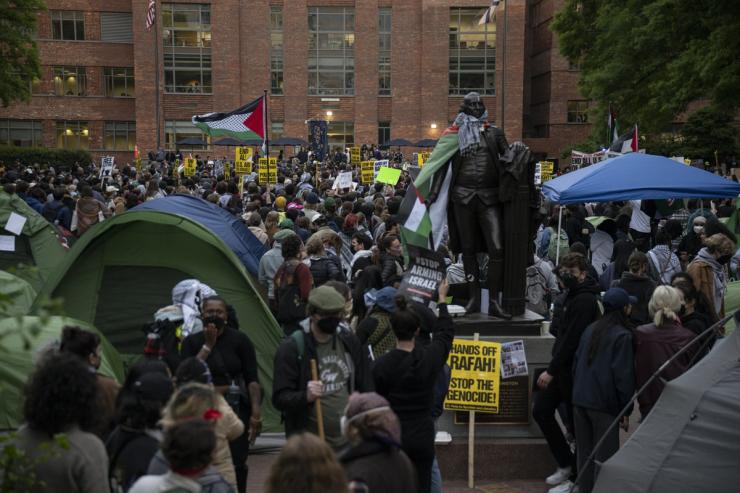The News
Police have arrested more than 400 people — including students, other activists, and faculty members — at pro-Palestinian protest encampments being held at universities across the nation.
The encampments started at Columbia University last week and quickly spread to dozens of colleges and universities, with students calling for an end to the war in Gaza and for their schools to divest their financial ties to Israel and pro-Israel companies and causes.
Police, clad in riot gear and wielding semi-automatic weapons, started making arrests at these protests last Thursday following Columbia University president Nemat “Minouche” Shafik’s calls for the New York Police Department to break up the encampment at her university. More than 100 protesters were arrested at Columbia, and more arrests followed at schools across the country including Indiana University and Emory University as school presidents issued similar calls for police involvement.
Columbia University’s senate is poised to vote Friday on a resolution expressing displeasure with Shafik’s handling of the situation. University senators initially planned a censure vote, but have watered down their resolution over concerns about removing the president at a time of campus turmoil.
SIGNALS
Columbia censure vote watered down in part over concerns of caving to GOP
Shafik, who is also facing growing pressure from the Republican Party to step down over claims that she’s allowed antisemitism to thrive on campus, has defended her decision to involve police. “There were hundreds of people sleeping out in an unsafe environment,” she said at a faculty meeting, conceding that she had not visited the encampment.
Columbia’s university senate opted to admonish Shafik without censuring her in part to avoid being “perceived as yielding to Republican lawmakers who had called for her resignation,” The New York Times reported. “It really isn’t a precedent any university wants to set,” a Columbia faculty member told the paper. “We shouldn’t be bullied by someone in Congress.”
Divestment is ‘practically impossible,’ some experts say
Experts told The Washington Post that students’ calls for their universities to divest from weapons manufacturers and companies that do business with Israel would be “practically impossible” to follow through on. Most schools’ relationships with Israeli-based interests would be via endowments invested in index funds, and it’s “impossible to know just how and where universities’ endowments are invested.” But not everyone agrees with that assessment: “I think anything is possible in today’s financial services industry,” the executive director and cofounder of the Intentional Endowments Network told the Associated Press.
Campus divestment movements have a long history — and some have seen success. Several schools including Harvard and Princeton committed to divesting from fossil fuels in 2021; and many schools have rules barring investments in categories such as alcohol, tobacco and gambling.
Activists escalate their tactics — and police do too
Though they’ve just started making international headlines, The Washington Post noted, campus protests began within days of Hamas’s Oct. 7 attack on Israel. Supercharged by social media, student involvement escalated throughout the winter and spring, with protesters employing “increasingly aggressive tactics after saying they got little or no response from administrators.”
Police are also escalating their tactics, increasingly using force — shooting rubber bullets, wrestling protesters to the ground, and firing pepper balls at crowds — to disperse the encampments. Some Republicans have called on President Joe Biden to send in the National Guard to protect Jewish students, which he does not seem inclined to do. “This response to peaceful protest is an assault on free speech — and it is also deeply reckless,” Knight First Amendment Institute said in a statement Thursday.



